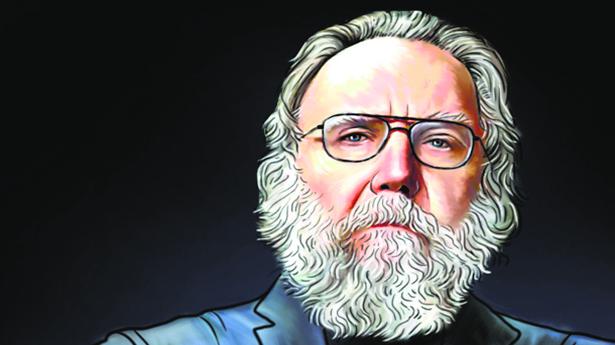
Alexander Dugin | The guru of Neo-Eurasianism
The Hindu
The Russian political philosopher believes in an expansionary civilisational state
Late evening on August 20, 29-year-old Darya Dugina was driving back to Moscow after attending an arts festival when a blast ripped through her SUV, killing her instantly. A bomb had been planted on the underside of the vehicle, and detonated remotely. Dugina’s death made global headlines as many believed that the intended target was her father Alexander Dugin, an ideologue and political philosopher often described by Western commentators as ‘Putin’s Rasputin’.
Mr. Dugin, 60, is known foremost for propagating the concepts of ‘Novorossiya’ or ‘New Russia’ and ‘Russky Mir’ or ‘Russian world’. Together, these two ideas underpin an ultra-nationalist ideology that envisions Russia as a civilisational state at the heart of a Eurasian power bloc that would stretch from Vladivostok to Western Europe. He outlined his vision in Foundations of Geopolitics (1997), which was lapped up by disillusioned Russians struggling to find their bearings in the chaotic post-Communist years.
Mr. Dugin’s geopolitics is inspired by the conservative German political scientist Carl Schmitt, who shared a close but ambivalent relationship with the Nazi party (he was interrogated but not charged at the Nuremberg trials). Drawing on Schmitt’s Land and Sea: A World-Historical Meditation (1942), Mr. Dugin argues that the world’s primary geopolitical conflict is between the forces of the Sea and those of the Land — that is, between the island/Atlantic powers represented today by the U.S./U.K. and the continental ones, represented by the Eurasian landmass stretching from coastal France all the way to Japan.
In this schema — Mr. Dugin believes American foreign policy is premised on it — the Sea Forces’ ascendancy would necessitate preventing the integration of the Eurasian landmass into a continent-sized geopolitical power.
This entails ensuring that its biggest powers (Germany and Russia) and the entire region of eastern and central Europe that used to be part of Russia’s sphere of influence can never be integrated. NATO’s raison d’etre, Mr. Dugin believes, is precisely to prevent such integration. For him, this conflict is not merely geopolitical but also civilisational, opening the door to ultranationalism. In his other influential book, The Fourth Political Theory (2009), Mr. Dugin draws on the three dominant political theories of the 20th century — liberalism, fascism and communism — to amalgamate a “fourth” political theory that would have the best elements of the three but none of their shortcomings.
His new theory is based on what he calls the “ethnos”. Standing in opposition to liberal individualism, democracy and ‘progressivism’, this ethnos is defined by a shared culture and a set of ‘eternal’ values rooted in the Russian Orthodox Church. Not surprisingly, Mr. Dugin’s political theory turns out to be another version of ethno-nationalism, one that he calls ‘Neo-Eurasianism’.
A question that comes up in any discussion of Mr. Dugin is: how influential is he in the Kremlin? Some analysts cite Mr. Putin’s annexation of Crimea in 2014 and the invasion of Ukraine this year — both of which Mr. Dugin had been advocating for a long time — to suggest Mr. Putin has bought into Mr. Dugin’s thinking. They also point to the resurgence of ‘Eurasian integration’ as a key strategic objective of Mr. Putin’s foreign policy.

 Run 3 Space | Play Space Running Game
Run 3 Space | Play Space Running Game Traffic Jam 3D | Online Racing Game
Traffic Jam 3D | Online Racing Game Duck Hunt | Play Old Classic Game
Duck Hunt | Play Old Classic Game











